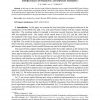Free Online Productivity Tools
i2Speak
i2Symbol
i2OCR
iTex2Img
iWeb2Print
iWeb2Shot
i2Type
iPdf2Split
iPdf2Merge
i2Bopomofo
i2Arabic
i2Style
i2Image
i2PDF
iLatex2Rtf
Sci2ools
101
Voted
SIAMJO
2000
2000
Superlinear Convergence and Implicit Filtering
In this note we show how the implicit filtering algorithm can be coupled with the BFGS quasi-Newton update to obtain a superlinearly convergent iteration if the noise in the objective function decays sufficiently rapidly as the optimal point is approached. We show how known theory for the noise-free case can be extended and thereby provide a partial explanation for the good performance of quasi-Newton methods when coupled with implicit filtering. Key words. noisy optimization, implicit filtering, BFGS algorithm, superlinear convergence AMS subject classifications. 65K05, 65K10, 90C30
Implicit Filtering | Implicit Filtering Algorithm | SIAMJO 2000 | Superlinearly Convergent Iteration |
| Added | 19 Dec 2010 |
| Updated | 19 Dec 2010 |
| Type | Journal |
| Year | 2000 |
| Where | SIAMJO |
| Authors | T. D. Choi, C. T. Kelley |
Comments (0)

